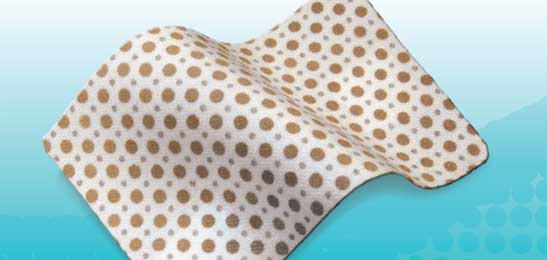Bandages have changed very little over the years, but a new wound-care treatment called Prosit, developed here in the Valley, is shifting that paradigm.
Prosit is a single-layer polyester fabric dressing that covers a wound like a bandage. But when moistened, it generates a micro-electric current that kills microbes — bacteria, viruses, fungus, mold, yeast — and stops them from penetrating skin. It also diminishes pain, speeds healing and can be cut to fit any size wound. Prosit was approved by the U.S. Food and Drug Administration in 2006 as an antimicrobial barrier to infection. Last year, the FDA cleared Prosit for use in the care of all types of wounds, the number of days it can be used and for over-the-counter sales. Consumers can expect to see Prosit on store shelves later this year.
Jeff Skiba, product inventor and chief executive officer of Vomaris Innovations (formerly Silverleaf Medical Products) in Chandler, says local doctors and hospitals have been using Prosit for more than a year to effectively treat chronic wounds, surgical wounds, diabetic ulcers, cuts, burns and pain from laser resurfacing and shingles. Shingles patients reported feeling no pain after covering the rash with the antimicrobial dressing, and after a week the shingles were gone.
Skiba himself had laser skin resurfacing to understand the pain level after the procedure and test Prosit on facial burns. Pain afterwards was an eight out of 10, he says, so he used the antimicrobial dressing to cover the wounds on his face. Prosit eliminated the pain and helped heal the skin in four days instead of a few weeks, Skiba says.
“The pain from this procedure was excruciating, so without Prosit I would have needed to take a narcotic to kill the pain,” he says. “Most doctors prescribe Percocet to calm it down.”
Sun Lakes resident Ed Foster, 66, met Skiba by chance one day when the inventor stopped in at Tolivers Carpet One in Tempe to buy flooring for his office. Foster says Skiba noticed the wound on the stump where he had a finger removed 20 years ago, and he said he had a product that might help it. Foster had surgery on the stump a few years ago to remove a piece of metal. Due to the way it was bandaged, bone pushed out the end of the finger and wouldn’t heal.
“I went to see the top hand surgeon in the Valley right before I met Jeff, and he recommended getting my digit removed down to my hand, which I didn’t want to do,” Foster says. “So I gave Jeff a call and started using Prosit. New skin grew over the bone that was sticking out, so now you really can’t tell what it is, and the wound closed completely. Prosit was simple to use and now I’m completely healed. I couldn’t be happier.”
Major military hospitals around the country are also seeing promising results from the wound-care treatment. Walter Reed Hospital in Washington, D.C., is treating seriously injured soldiers from Iraq. One particular soldier was scheduled for an amputation, but was able to cancel it after Prosit was applied to the open wound on his leg. The bioelectric dressing stimulated the skin around the wound and prompted skin tissue to start growing back and cover the bone and tendons. After two weeks, the entire wound was healed.
“We’ve tested Prosit on the worst of the worst wounds and we’re seeing remarkable results,” Skiba says. “The only thing it does not work on is cancer wounds. The cancer has to be removed first, and then it can be applied to heal the surgical wound.”
Tucson dermatologist and oncologist, Dr. Scott Sheftel, was so impressed with the results of Prosit after testing it on patients, that he got involved conducting research for Vomaris Innovations.
“No one across the board has ever addressed wound care like this,” Sheftel says. “Prosit is an amazing wound treatment that will one day show up on drugstore shelves as an option next to band-aids.”
Skiba raised $3.5 million in angel financing to pay for FDA approvals and product testing. Skiba is a graduate of Arizona State University and has degrees in both bioengineering and business.
Vomaris Innovations manufactures Prosit at its plant in Tucson. The company has 10 employees and plans to add 15 more this year between its Chandler office and the Tucson manufacturing facility.
“We already have a few big box retail chains that are interested in carrying Prosit,” Skiba says. “We’ll put it on store shelves so it’s available for simple things like bug bites, scraped knees and cuts. But we will continue focusing on chronic wound patients who have had nothing, until now, to help them.”




